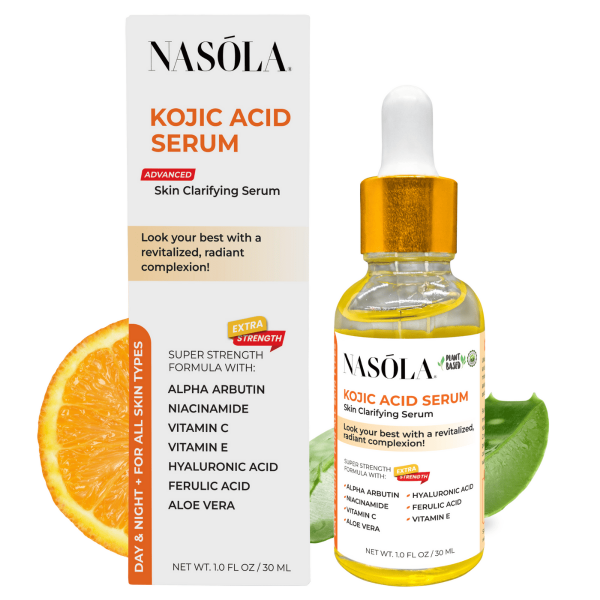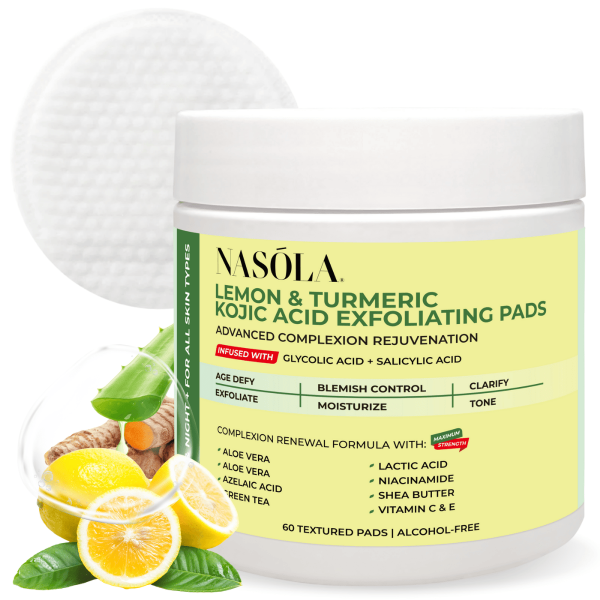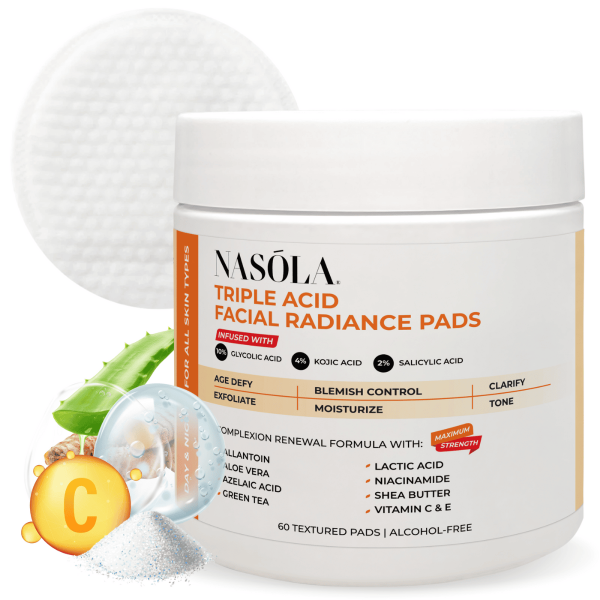If you’ve ever looked in the mirror and felt your skin looked tired, uneven, or just dull — you’re not alone. From acne scars that overstay their welcome to dark spots that seem to pop up out of nowhere (WHY??), so many of us are on the hunt for that radiant, even-toned skin glow. A well-formulated face whitening cream can be exactly what changes everything — without bleach, without gimmicks, and without second-guessing what’s in your jar of magic.
Here’s the truth: hyperpigmentation, sun spots, and uneven skin tone aren’t just cosmetic inconveniences — they can chip away at your confidence. I’ve seen it — in clients, friends, and even myself.
The good news? There are proven ingredients, gentle formulas, and targeted products like Nasola Kojic Acid Cream, Nasola Triple Acid Facial Radiance Pads, or the Nasola Lemon Turmeric Kojic Acid Exfoliating Pads that work overtime so you don’t have to.
Let’s show you how to choose the right one — and why the glow you’ve been longing for is closer than you think.
- Face Whitening Cream: What It Is and How It Works
- Whitening Cream for Face: What to Look for When Choosing One
- Whitening Face Cream: How It Compares to Other Brightening Products
- Best Whitening Cream for Face: Top Product Recommendations
- Face Whitening Cream for Women: Tailored Solutions for Female Skin
- Face Whitening Cream for Men: Is There a Difference?
- Kojic Acid: The Star Brightening Ingredient
- Conclusion
- Frequently Asked Questions
Face Whitening Cream: What It Is and How It Works
Understanding how a face whitening cream works is the first step to unlocking brighter, clearer, and more luminous skin. Unlike your everyday moisturizer, a face whitening cream is specially designed to reduce the appearance of dark spots, melasma, acne scars, and overall unevenness.
These creams typically use active ingredients like kojic acid, turmeric, niacinamide, and alpha hydroxy acids (AHAs) to suppress melanin production, gently exfoliate dead skin cells, and encourage skin renewal.
But not all whitening creams are made equal…
Here’s what a good face whitening cream should do:
- Inhibit melanin production safely
- Fade hyperpigmentation without damaging healthy skin
- Be non-comedogenic and suitable for daily use
- Contain natural, nourishing ingredients alongside actives
Kojic Acid: The Natural Brightener
Kojic acid is one of the most effective skin-lightening ingredients derived from fermented rice. It works by interrupting tyrosine production — a precursor to melanin.
The Nasola Kojic Acid Cream showcases this beautifully. It’s a gentle yet potent blend of kojic acid and botanical extracts, perfect for fading stubborn discoloration like melasma, sun spots, and dull patches. With regular morning and evening use, you’ll start noticing smoother, more radiant skin in just a few weeks.
Pro tip? Use a broad-spectrum SPF afterward to seal in the benefits and protect your glow. Trust me on this one.
Morning and Evening Routines Matter
To get the best out of any face whitening cream, consistency is crucial — but so is strategy.
Morning:
- Cleanse
- Apply serum (like Nasola Kojic Acid Serum)
- Layer your whitening cream
- Follow with SPF
Night:
- Double cleanse (especially if you wear sunscreen or makeup!)
- Use exfoliating pads 2–3 times a week
- Apply your whitening cream
- Lock in with a nourishing night moisturizer if needed
A consistent, balanced routine does wonders. Your skin loves rhythm just as much as rest.
Whitening Cream for Face: What to Look for When Choosing One
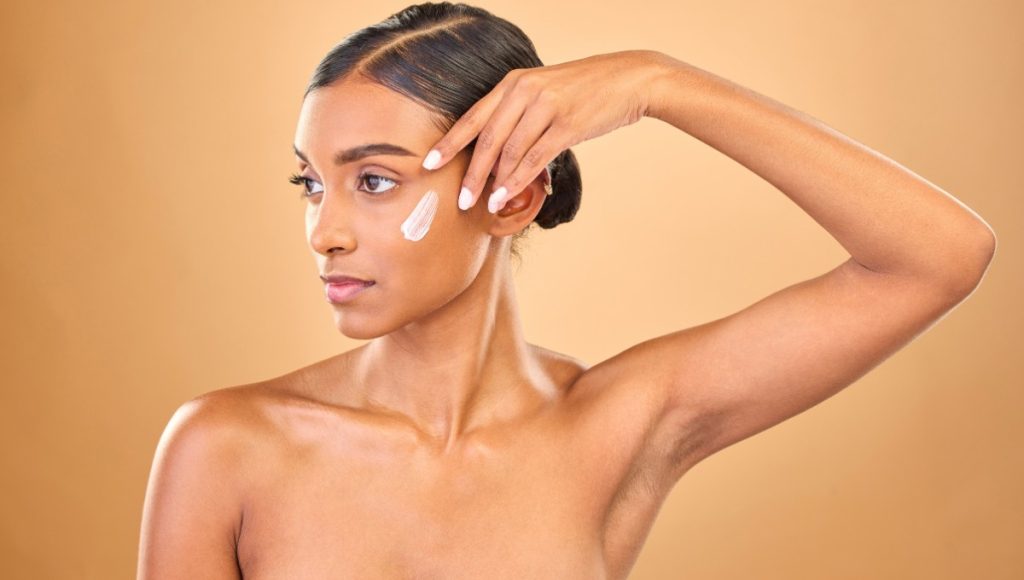
Choosing the right whitening cream for face can feel overwhelming — and I’ve been there. There are shelves (and online carts) full of pretty jars with big promises. So, what makes a product truly worthy of your skin?
The best whitening cream for face should combine safety, science, and soothing elements. Don’t settle for aggressive bleaching agents or buzzy trends that do more harm than good.
Here’s what I tell my clients to check for — always, no exceptions:
- Dermatologist-tested or supported by clinical data
- Contains natural brightening agents like kojic acid or alpha arbutin
- Free from sulfonates, artificial fragrances, and hydroquinone (unless prescribed)
- Lightweight and non-sticky formula
The Power of Kojic Acid in Serums
Looking for something lighter? The Nasola Kojic Acid Serum is your glow-getting partner in crime. It’s water-light, fast-absorbing, and layers beautifully under moisturizers or sunscreen. With kojic acid and botanical extracts in the mix, it hydrates while working to improve tone and texture.
This serum is especially helpful for people with oily or combination skin who hate heavy layers.
Key Ingredient: Kojic Acid
Kojic acid isn’t just a trend ingredient — it’s a consistent performer.
Here’s why dermatologists trust it:
- Reduces melanin production by inhibiting tyrosinase
- Helps fade dark spots and discoloration over time
- Works well on all skin tones, especially for post-acne pigmentation and melasma
- Less irritating than traditional bleaching agents
When combined with hydrating botanicals, kojic acid becomes a powerful yet gentle friend in your skincare circle.
Whitening Face Cream: How It Compares to Other Brightening Products
All whitening face cream products are not created equal — and some aren’t cream-based at all. This is where most people get confused: What’s better — creams, serums, pads, or exfoliating solutions?
Let’s break it down so you can make the best choice for where your skin is today.
Creams are best for long-term hydration and targeted fading. Serums give quick absorption and layering flexibility. Exfoliating pads stimulate cell turnover and clean the canvas so your actives shine.
Combining methods? Smart. But timing is key.
Supporting Product: Nasola Triple Acid Facial Radiance Pads
Meet your exfoliation hero: Nasola Triple Acid Facial Radiance Pads. Packed with glycolic, lactic, and salicylic acids — these pads gently sweep away dead skin cells, allowing your whitening cream to penetrate deeper and work smarter.
Use 2–3 times a week (night only, please), and you’ll see the brightness build over time.
Key Ingredient: Glycolic Acid
Glycolic acid might be tiny in molecule size, but its impact is anything but small.
- Penetrates deep into the skin to clear pore congestion
- Speeds up cell renewal for a more even tone
- Helps soften fine lines and smooth texture over time
- Improves absorption of other actives like kojic acid
It teams up beautifully with nourishing creams when you’re chasing smooth, flawless skin.
Best Whitening Cream for Face: Top Product Recommendations
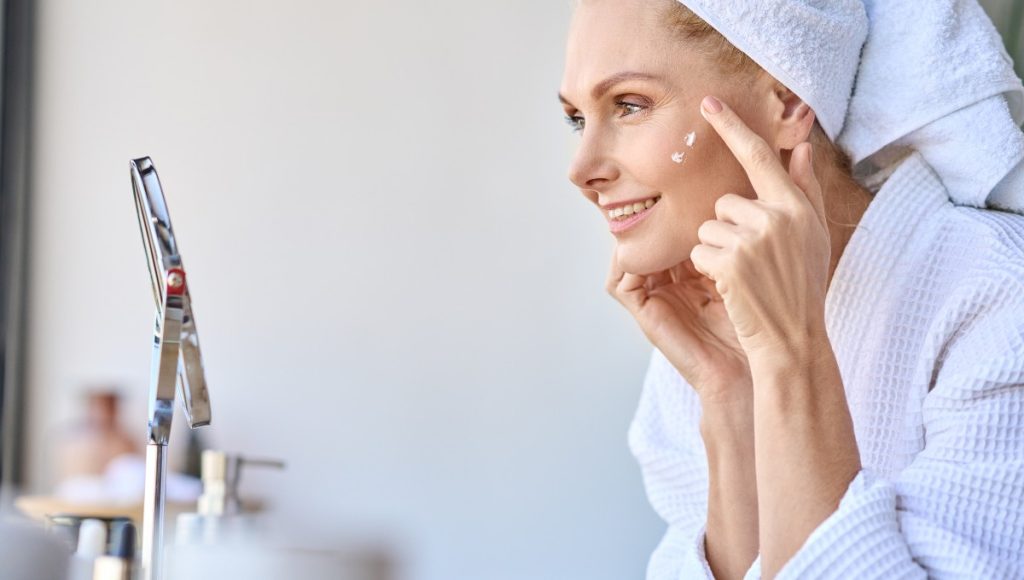
Now for the good stuff — the best whitening cream for face options that actually live up to their promises (and reviews).
Whether you’re on the hunt for daily hydration plus pigment correction, or a lightweight option to tackle summer dullness — here are your must-haves:
- Nasola Kojic Acid Cream – Best for everyday consistency
- Nasola Kojic Acid Serum – Best for oily/combo skin types
- Nasola Lemon Turmeric Kojic Acid Exfoliating Pads – Best gentle exfoliation plus brightening
Key Ingredient: Turmeric
Turmeric isn’t just for your golden lattes. Its antioxidant-rich profile calms inflammation and helps reduce the intensity of pigmentation. That’s why it’s the star in Nasola Lemon Turmeric Kojic Acid Exfoliating Pads.
Use these twice a week to sweep away dull skin — they prepare the skin for absorption while delivering natural brightening power.
Key Ingredient: Vitamin C
Vitamin C brightens. Period.
When paired with kojic acid or glycolic acid, it works harder at:
- Interrupting melanin synthesis
- Boosting collagen production
- Reversing sun-related pigmentation damage
- Improving overall glow
It’s basically the pixie dust of skin care (and no, I don’t say that lightly).
Face Whitening Cream for Women: Tailored Solutions for Female Skin
Hormones are sneaky — and if you’re a woman, your skin probably already told you that. From pregnancy to perimenopause, hormonal shifts can trigger melasma, hyperpigmentation, and texture changes.
That’s why a face whitening cream for women must do more than fade marks. It has to hydrate, protect, and soothe too.
All-In-One Cream: Nasola Kojic Acid Cream
The Nasola Kojic Acid Cream nails this trifecta. It targets discoloration while nourishing with gentle botanicals. Think glow, minus the sensitivity.
Women dealing with hormonal pigmentation will appreciate how this cream supports the skin barrier while gently lifting unwanted pigment over time.
Key Ingredient: Aloe Vera
Aloe vera is nature’s built-in calm button:
- Reduces inflammation and redness
- Hydrates deeper layers of the skin
- Helps soothe hormonally reactive or sun-sensitized skin
- Supports skin repair and barrier restoration
It’s a must-have for daily use if your skin tends to freak out easily.
Face Whitening Cream for Men: Is There a Difference?
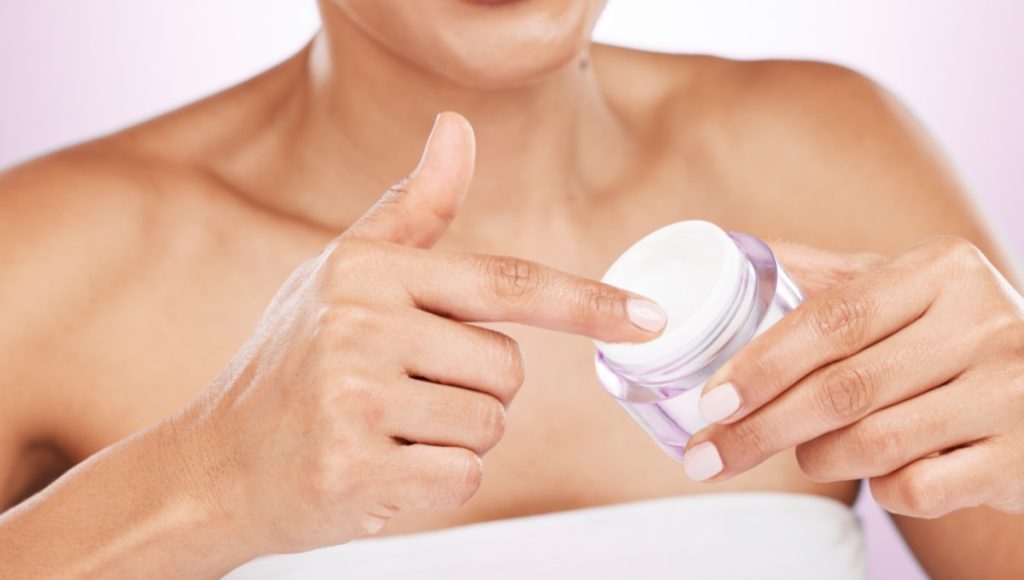
YES. Men’s skin is typically oilier, thicker, and more prone to irritation from shaving. That doesn’t mean you need different ingredients — but textures, exfoliation levels, and soothing agents matter.
A face whitening cream for men should handle those deeper layers and irritation triggers without clogging pores or making your skin feel greasy.
Ideal Pre-Treatment: Nasola Lemon Turmeric Kojic Acid Exfoliating Pads
These exfoliating pads offer just enough abrasion to clear dead skin cells, reduce post-shave bumps, and prep skin before you apply a whitening cream or serum.
Plus, the turmeric and kojic acid duo bring brightening benefits while still being gentle.
Key Ingredient: Salicylic Acid
A game-changer for men’s skin, salicylic acid:
- Penetrates oily skin deeply to unclog pores
- Reduces breakouts and prevents blemish-related discoloration
- Calms inflammation and razor bumps
- Prepares the skin for better absorption of creams
When used in a pre-treatment routine, results become more dramatic (and fast too).
Kojic Acid: The Star Brightening Ingredient
Kojic acid is the MVP of non-toxic, non-irritating brightening actives — and it’s backed by science. Originally derived from mushrooms and a by-product of sake brewing (cool, right?), kojic acid lightens by preventing excess melanin synthesis.
Skin concerns it helps with?
- Melasma
- PIH (post-inflammatory hyperpigmentation)
- Freckles and sun spots
- Acne scars
Both Nasola Kojic Acid Cream and Nasola Kojic Acid Serum include cocktail blends with kojic acid, which makes them safe for daily use with visible results by Week 2 or 3.
For best results, pair with exfoliation and daily SPF.
Conclusion
Your skin deserves clarity — not just in appearance, but also in how you care for it.
Choosing the right face whitening cream doesn’t mean bleaching or fighting your natural tone. It’s about restoring balance, fading damage, and finding joy in your reflection. Whether your concern is melasma, acne scars, or stubborn sun spots, ingredients like kojic acid, turmeric, and glycolic acid offer safe, effective options.
Ready to bring your glow back (or out for the first time)?
Explore our favorites:
- Nasola Kojic Acid Cream
- Nasola Kojic Acid Serum
- Nasola Lemon Turmeric Kojic Acid Exfoliating Pads
- Nasola Triple Acid Facial Radiance Pads
You’re not far off — skincare should feel good, not confusing. Let’s glow.
Frequently Asked Questions
The Nasola Kojic Acid Cream is a top-rated option thanks to its powerhouse blend of kojic acid and natural plant-based ingredients. It effectively fades dark spots, acne scars, melasma, and more — without harsh chemicals. Plus, it’s gentle enough for daily use on sensitive skin.
When used consistently twice daily, most people notice a significant reduction in discoloration within 2 to 4 weeks. Products like Nasola Kojic Acid Serum tend to work faster due to their lightweight, deeply absorbing formulas.
Yes! Many whitening creams are unisex, including Nasola Kojic Acid Cream. However, some men may benefit from prepping their skin with Nasola Lemon Turmeric Kojic Acid Exfoliating Pads to better absorb treatments.
Absolutely. Many whitening creams work by reducing melanin production and increasing skin renewal. The Nasola Triple Acid Facial Radiance Pads help slough off scarred cells and make the skin more receptive to healing.
Steer clear of hydroquinone (unless prescribed), mercury, corticosteroids, or artificial fragrance. Stick with safe and effective actives like kojic acid, niacinamide, turmeric, and AHAs — all found in Nasola’s range.
Yes, daily use is encouraged for optimal results. Just follow with SPF! The Nasola Kojic Acid Cream works well as a daily brightening moisturizer.
Whitening’ focuses on pigmentation reduction, ‘lightening’ aims to fade scars and patches, and ‘brightening’ enhances overall glow. Nasola products offer all three benefits when used properly
Yes, products like Nasola Kojic Acid Cream and Nasola Kojic Acid Serum are made with soothing botanicals and are free from harsh additives, making them suitable for sensitive skin.
Yes! Gentle exfoliation helps remove dead skin and allows your whitening cream to absorb better. Try Nasola Lemon Turmeric Kojic Acid Exfoliating Pads.
Serums like the Nasola Kojic Acid Serum absorb faster and penetrate deeply, ideal for layering. Creams are best when you want long-lasting moisture plus tone correction.


